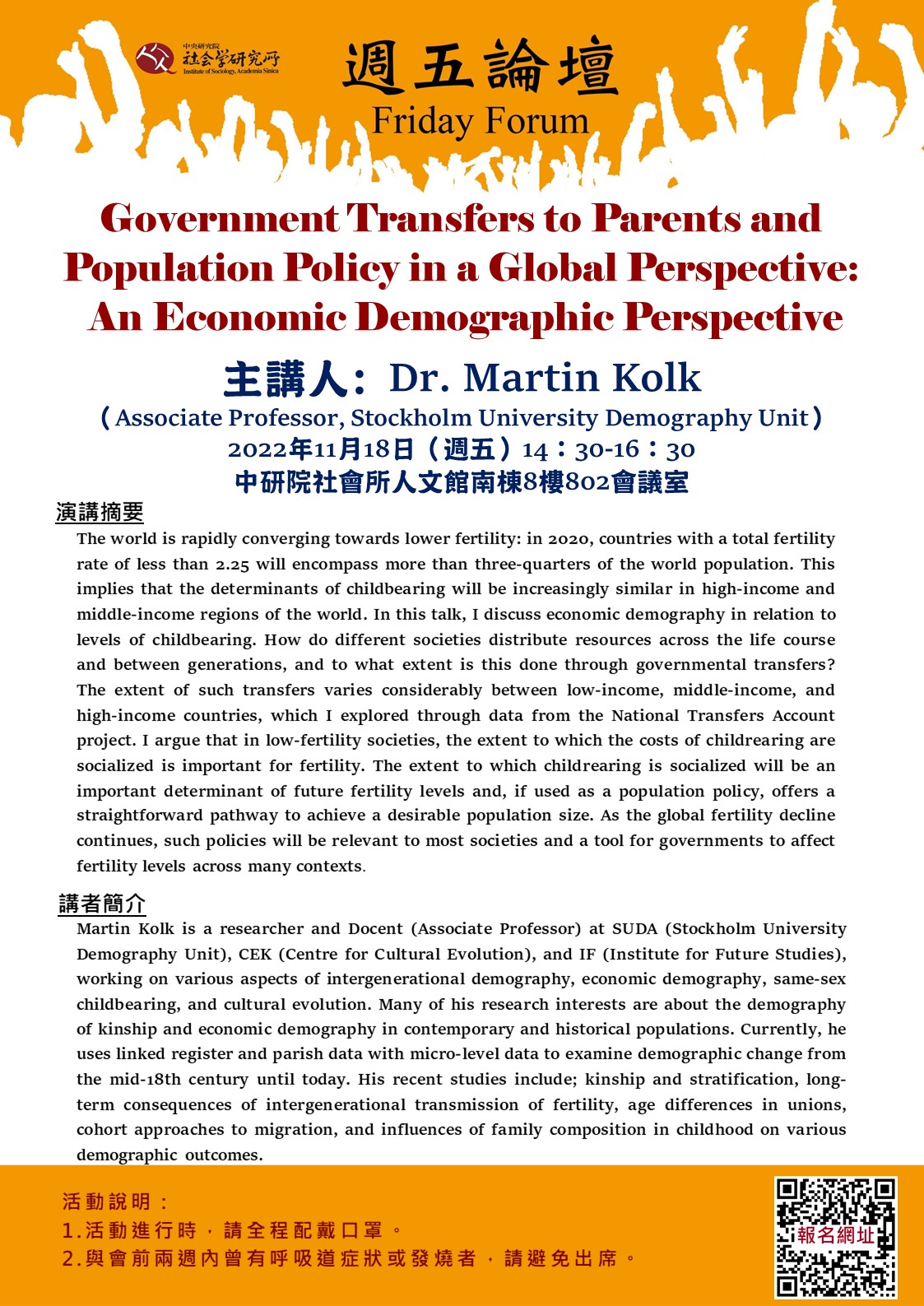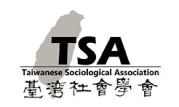中研院社會所11/18週五論壇
2022-11-02
中央研究院社會學研究所11月份週五論壇活動訊息如下,歡迎有興趣的朋友踴躍報名參加!
【講題】Government Transfers to Parents and Population Policy in a Global Perspective: An Economic Demographic Perspective
【講者】Dr. Martin Kolk (Associate Professor, Stockholm University Demography Unit)
【主持】鄭雁馨(本所副研究員)
【時間】2022.11.18(五),14:30-16:30
【地點】本所802會議室(中研院人文社會科學館南棟8樓)
【報名】https://forms.gle/3HzYLZxr6edf6KmR8
【活動聯絡】梁雅惠, as0200802@gate.sinica.edu.tw
【演講簡介】
The world is rapidly converging towards lower fertility: in 2020, countries with a total fertility rate of less than 2.25 will encompass more than three-quarters of the world population. This implies that the determinants of childbearing will be increasingly similar in high-income and middle-income regions of the world. In this talk, I discuss economic demography in relation to levels of childbearing. How do different societies distribute resources across the life course and between generations, and to what extent is this done through governmental transfers? The extent of such transfers varies considerably between low-income, middle-income, and high-income countries, which I explored through data from the National Transfers Account project. I argue that in low-fertility societies, the extent to which the costs of childrearing are socialized is important for fertility. The extent to which childrearing is socialized will be an important determinant of future fertility levels and, if used as a population policy, offers a straightforward pathway to achieve a desirable population size. As the global fertility decline continues, such policies will be relevant to most societies and a tool for governments to affect fertility levels across many contexts.
【講者簡介】
Martin Kolk is a researcher and Docent (Associate Professor) at SUDA (Stockholm University Demography Unit), CEK (Centre for Cultural Evolution), and IF (Institute for Future Studies), working on various aspects of intergenerational demography, economic demography, same-sex childbearing, and cultural evolution. Many of his research interests are about the demography of kinship and economic demography in contemporary and historical populations. Currently, he uses linked register and parish data with micro-level data to examine demographic change from the mid-18th century until today. His recent studies include; kinship and stratification, long-term consequences of intergenerational transmission of fertility, age differences in unions, cohort approaches to migration, and influences of family composition in childhood on various demographic outcomes.
【請來賓注意以下防疫事項】
1.本場次僅規劃現場參與。
3.活動進行中,請全程配戴口罩。(來賓請先自備口罩)
4.進入會議室前請先以酒精消毒手部。

【講題】Government Transfers to Parents and Population Policy in a Global Perspective: An Economic Demographic Perspective
【講者】Dr. Martin Kolk (Associate Professor, Stockholm University Demography Unit)
【主持】鄭雁馨(本所副研究員)
【時間】2022.11.18(五),14:30-16:30
【地點】本所802會議室(中研院人文社會科學館南棟8樓)
【報名】https://forms.gle/3HzYLZxr6edf6KmR8
【活動聯絡】梁雅惠, as0200802@gate.sinica.edu.tw
【演講簡介】
The world is rapidly converging towards lower fertility: in 2020, countries with a total fertility rate of less than 2.25 will encompass more than three-quarters of the world population. This implies that the determinants of childbearing will be increasingly similar in high-income and middle-income regions of the world. In this talk, I discuss economic demography in relation to levels of childbearing. How do different societies distribute resources across the life course and between generations, and to what extent is this done through governmental transfers? The extent of such transfers varies considerably between low-income, middle-income, and high-income countries, which I explored through data from the National Transfers Account project. I argue that in low-fertility societies, the extent to which the costs of childrearing are socialized is important for fertility. The extent to which childrearing is socialized will be an important determinant of future fertility levels and, if used as a population policy, offers a straightforward pathway to achieve a desirable population size. As the global fertility decline continues, such policies will be relevant to most societies and a tool for governments to affect fertility levels across many contexts.
【講者簡介】
Martin Kolk is a researcher and Docent (Associate Professor) at SUDA (Stockholm University Demography Unit), CEK (Centre for Cultural Evolution), and IF (Institute for Future Studies), working on various aspects of intergenerational demography, economic demography, same-sex childbearing, and cultural evolution. Many of his research interests are about the demography of kinship and economic demography in contemporary and historical populations. Currently, he uses linked register and parish data with micro-level data to examine demographic change from the mid-18th century until today. His recent studies include; kinship and stratification, long-term consequences of intergenerational transmission of fertility, age differences in unions, cohort approaches to migration, and influences of family composition in childhood on various demographic outcomes.
【請來賓注意以下防疫事項】
1.本場次僅規劃現場參與。
3.活動進行中,請全程配戴口罩。(來賓請先自備口罩)
4.進入會議室前請先以酒精消毒手部。




